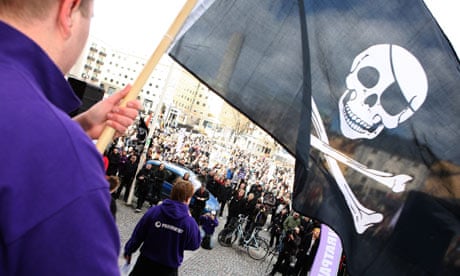Just over a week ago, the Pirate party won four seats in the elections in the state of Saarland, in southwest Germany. It is the latest success for what the movement's founder, Rick Falkvinge, calls "a major new political wave ... The establishment didn't know what hit them."
Last year, the German branch of the movement, which advocates internet freedom and government transparency, won 15 seats in Berlin's state parliament. The Swedish Pirate party was the first to be set up, in 2006. It holds two seats in the European parliament, though it failed to win a seat in the 2010 general election. And the movement has taken off around the world – there are now official parties, and more informal groups, in more than 50 countries.
Both Sweden and Germany have a system of proportional representation, so the idea that a Pirate party candidate could win a seat in the UK is improbable, though not impossible if a groundswell of enthusiasm among young voters disillusioned with mainstream politics is replicated. "The Bradford West result shows there is an appetite for different voices in British politics, and we're seeing it worldwide," says Loz Kaye, who leads Pirate party UK. "Across the world we are seeing an unacceptable crackdown on digital rights, civil liberties and a lack of openness in accountable government."
He wants to reduce copyright to 10 years, fight anti-piracy laws and allow non-commercial file-sharing, but Kaye insists the party, which claims to have 14,000 supporters, isn't only about digital freedom – the ideals of openness can be applied to drugs, for instance, by abolishing patents. "The NHS shouldn't be a cash cow for pharmaceutical companies," he says. "We're thinking about how to create jobs and an economy that is fit for the 21st century, and the growth area is in technology. How do you give the next generation skills and imagination, rather than just forming them into passive consumers?"
Nine candidates stood in the 2010 general election, but took just 1,340 votes. Kaye is one of the candidates campaigning in May's local elections in Manchester, Glasgow and Edinburgh, which means that in just over a month, we will see whether the Pirates will ever really make it in the choppy waters of British politics.

Comments (…)
Sign in or create your Guardian account to join the discussion